Interview: Vicki Iskandar Bestows Her CHINESE FIVE ELEMENTS ORACLE To All
Oracle reader & Feng Shui consultant Vicki Iskandar will be presenting her just released The Chinese Five Elements Oracle @ Vitello’s Velvet Martini Lounge October 22nd
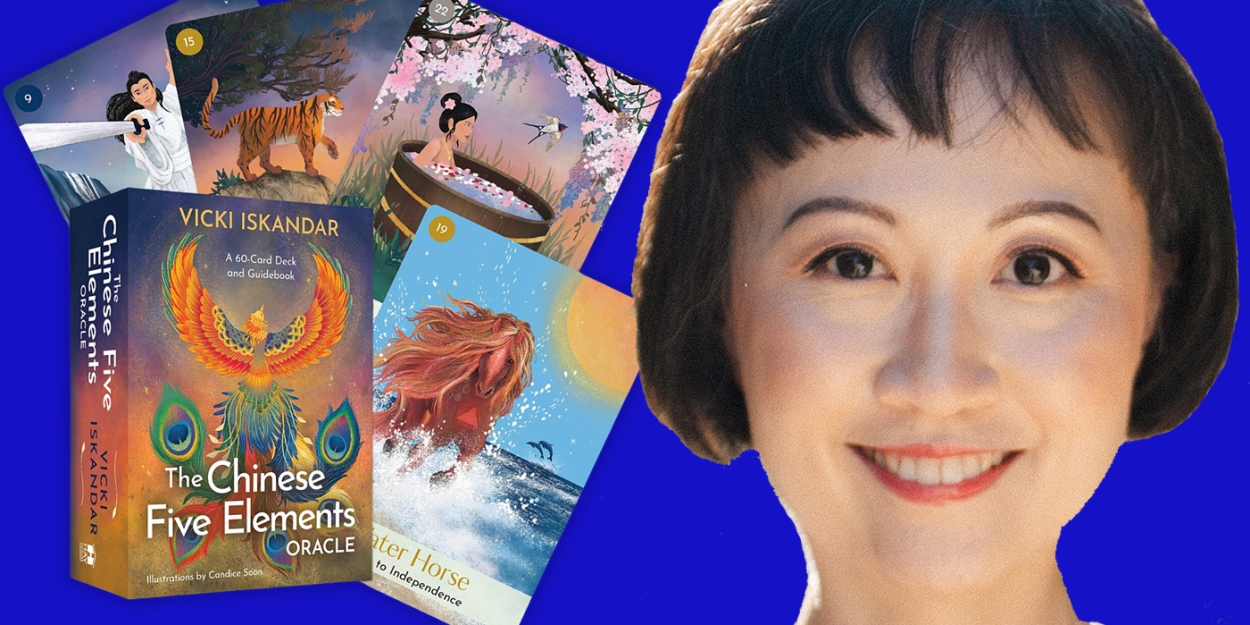
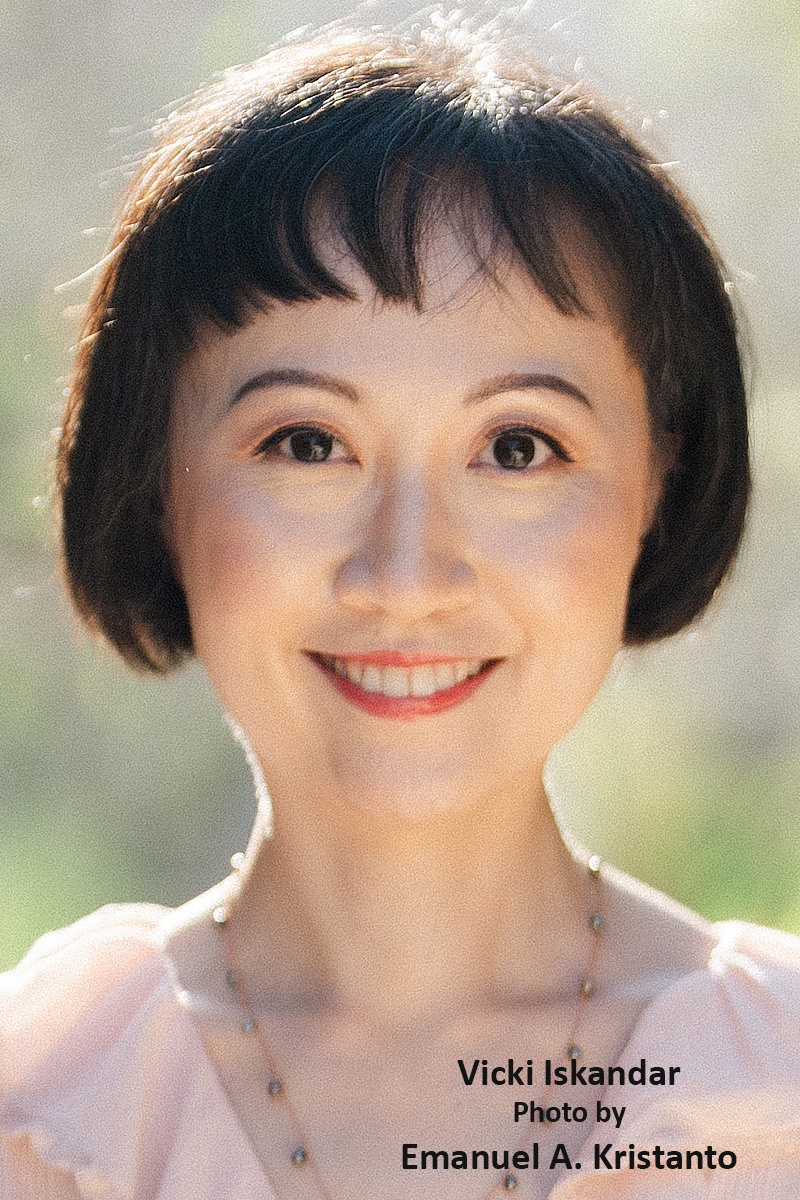
Oracle reader and Feng Shui consultant Vicki Iskandar will be presenting her just released The Chinese Five Elements Oracle at Vitello’s Velvet Martini Lounge as part of their Tarot Week, October 22, 2023.
Thank you for taking the time for this interview, Vicki!
You grew up amongst Chinese traditions and customs. What originally enticed you to pursue tarot reading and Feng Shui as a profession?
It was a natural progression. I originally studied Chinese metaphysics, including Chinese astrology and Feng Shui, for my own personal interest and started offering Feng Shui consulting as a side gig ten years ago while working in digital marketing. I spent the majority of 2017 house hunting. Feng Shui naturally served as my guidance in selecting the properties. It took about a year to find one that satisfied my criteria, and in the process, I started working with real estate agents whom I met during my search who turned out to have a big interest in Feng Shui, not only for themselves, but also for the homes that they were selling. I came to realize that I could and should do it full time and founded my Feng Shui practice in early 2018.
With oracle reading, I usually offer it to clients at the end of their sessions. I’d always thought that the 60 pillars would work very well as an oracle deck ever since I took my deep dive into Chinese astrology. It was a dream to create an oracle deck based on the 60 pillars and I’m beyond grateful to my publisher Hay House for making it possible for me to turn that dream into reality.
Whom did you seek out to sharpen your divining powers?
Instead of seeking out someone in the external world, I went within and explored my internal world. We all have intuition, we just have to listen to it, and the best way to awaken your inner intuition is to quiet those inner and external voices.
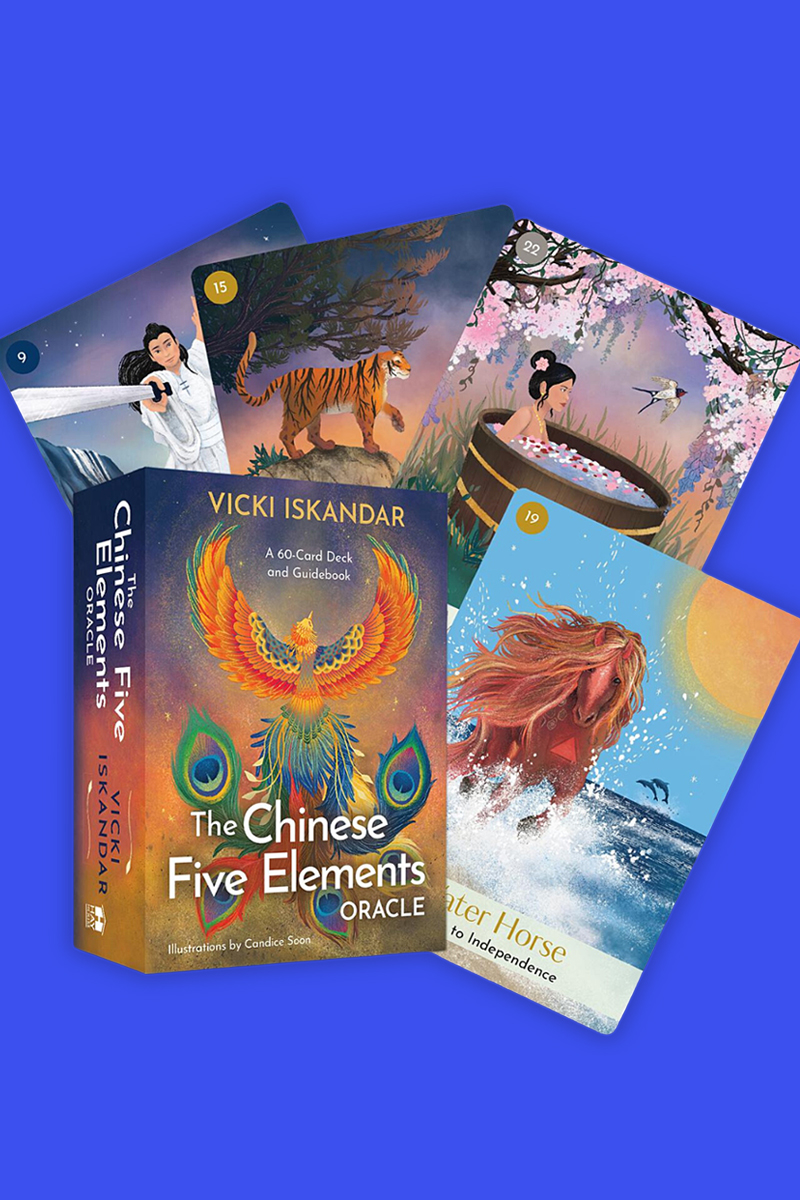 How did you decide upon the images of the 60 pillars of Chinese metaphysics in your The Chinese Five Elements Oracle?
How did you decide upon the images of the 60 pillars of Chinese metaphysics in your The Chinese Five Elements Oracle?
For each card I started with a general theme and a rough description of the pillar, which helped me visualize a general image and mood of the card. Then I’d go deeper into the visual in my art description for the card. For example, card 4, the Fire Rabbit, contains highly creative energies – Fire is the element that’s associated with the entertainment industry, and the Rabbit as a Yin Wood sign represents the ultimate artist. My vision for the card is of a performer in the spotlight, which itself also symbolizes Fire element. In many of these cards, I was also inspired by Chinese mythology and magical landscapes of China.
How much input did you have in the gorgeous illustrations by Candice Soon?
Candice was amazing in translating my vision into the artwork and I found that the more details I gave her in my descriptions, the closer her first sketch would be to what I envisioned. Often her first sketch would also give me more ideas and symbols to add to the original vision. For example, the Wood Dragon card originally didn’t have the Dragon holding the pearl, but when the first sketch came, the pearl was just calling to be included in the card. I could feel we were both tapping into divine guidance and the wisdom of our ancestors. I see it as a wonderful creative collaboration between the artist and I, our ancestors, and the divine.
A standard deck of cards has four suits of one through king. Does your Oracle of 60-numbered cards follow any standard order for tarot decks? Or is the Oracle your unique interpretation?
The cards are numbered according to the order of the 60 pillars, which starts with Yang Wood as the first of the ten heavenly stems (which are the Yang and Yin manifestations of the five elements), and the Rat as the first of the 12 animals, so in a way it’s structured like a tarot deck where there’s a specific order. The 60 pillars themselves are the 60 possible combinations of the five elements and the 12 animal signs. As mentioned in the guidebook, the cards are numbered in the order of the productive cycles of the five elements, starting with Yang Wood and ending with Yin Water, while the 12 animal signs repeat in the following order: the Rat, the Ox, the Tiger, the Rabbit, the Dragon, the Snake, the Horse, the Sheep (also called Goat or Ram), the Monkey, the Bird (or Rooster), the Dog, and the Pig (or Boar).
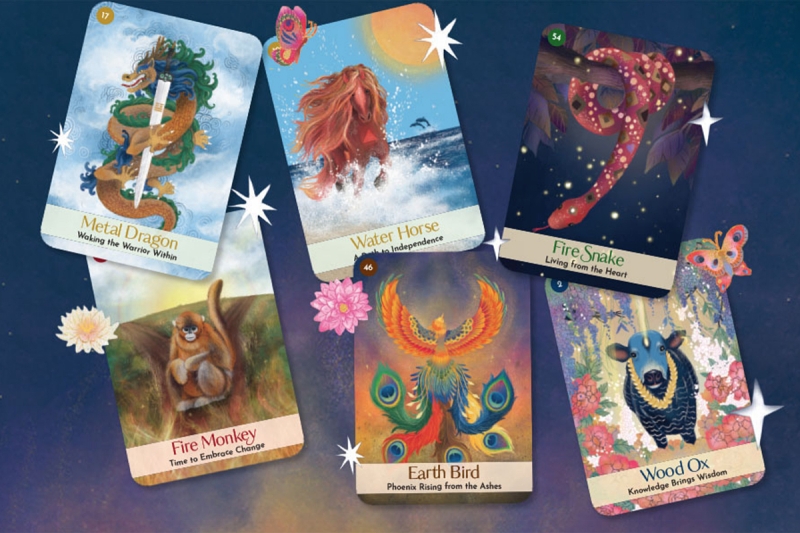 There is a variety of animals associated with each element. How did you choose the animals in your Oracle?
There is a variety of animals associated with each element. How did you choose the animals in your Oracle?
The animals are in the order of the 12 animal signs of the Chinese zodiac, which repeat in the following order: the Rat, the Ox, the Tiger, the Rabbit, the Dragon, the Snake, the Horse, the Sheep (also called Goat or Ram), the Monkey, the Bird (or Rooster), the Dog, and the Pig (or Boar). The cards show different types of species in depicting some of the animal signs, as the Chinese characters for these signs are not specific to a particular species. For example, the Sheep cards also feature goats as the Chinese word yáng can mean sheep, goat, and ram.
What challenges did you find in combining Eastern and Western astrology and metaphysics?
I find that Chinese astrology, with its emphasis on the five elements, is more relatable and applicable to our daily life as the elements, which represent forces of nature, are all around us. We can expect wet, rainy weather in a year or a month with strong Water influence, for example. The elements provide insights on the general overall energetic signature of the world at large. Western astrology’s emphasis on planetary aspects and transits provides me with additional context and depth in my daily insights, but unless those transits affect one’s natal chart personally, they usually just feel like a far-off influence that most people will not notice unless they keep up with the news all the time.
Describe how your practice of Qigong has helped you personally and professionally.
Learning about Chinese metaphysics expands the mind, but it’s also important that we connect with the five elements within us. Our understanding of the five elements becomes more profound when we also engage the body and spirit besides the mind. My Qigong practice allows me to connect physically, spiritually, and energetically with the Chinese Five Elements. Qigong has helped me stay centered, composed, and calm even in the midst of very stressful situations. A lot of the writing in my oracle deck was influenced by my Qigong practice.
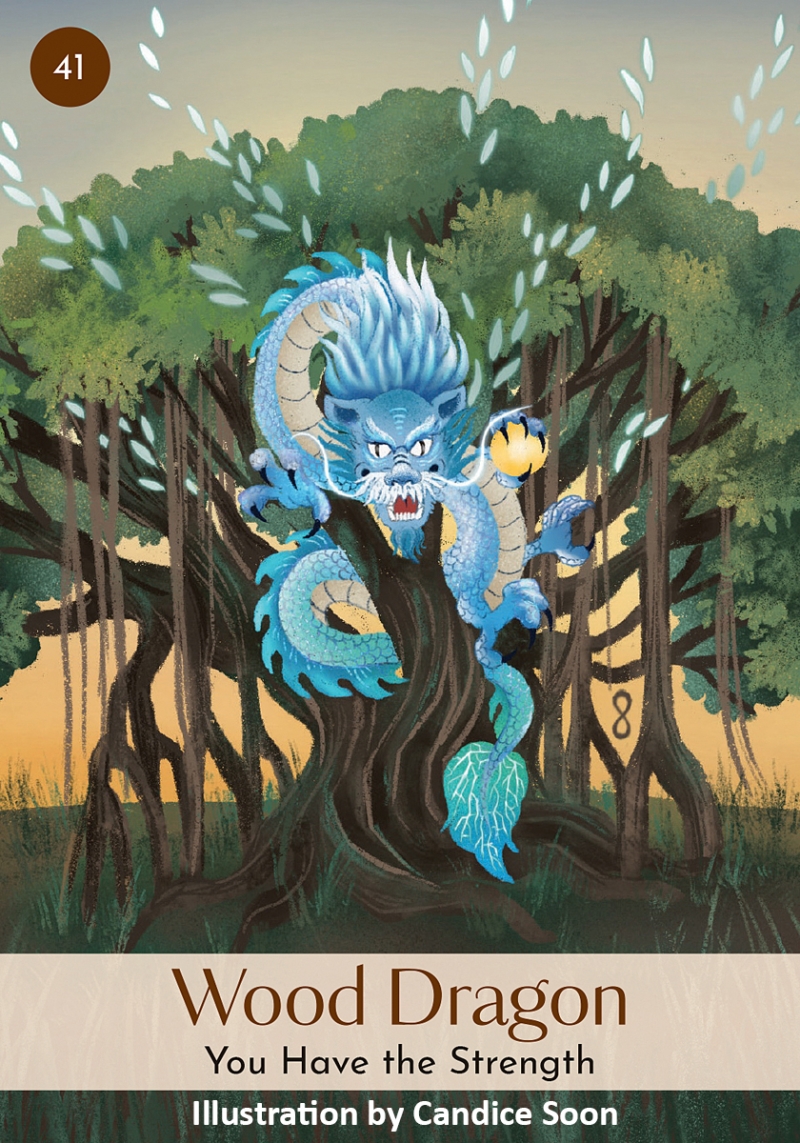 Qigong also teaches me to manage time better. The slowness of the movements in the practice has shown me that time is relative. Time flies when we fill our calendar with activities after activities. Qigong takes away whatever FOMO / fear of missing out I may have had - we can accomplish as much in less time if we actually slow down, recenter, strategize, and prioritize.
Qigong also teaches me to manage time better. The slowness of the movements in the practice has shown me that time is relative. Time flies when we fill our calendar with activities after activities. Qigong takes away whatever FOMO / fear of missing out I may have had - we can accomplish as much in less time if we actually slow down, recenter, strategize, and prioritize.
Did your real estate agent career come before your Feng Shui practice? Or vice versa?
It came after my Feng Shui practice. As a Feng Shui consultant, I enjoyed working with real estate agents so much that I decided to get my real estate license in 2020. I also wanted to be able to offer a unique service to those looking to buy or sell their homes. Integrating Feng Shui at the beginning of one’s home-buying process is a wiser move than having it done after. It’s easier to Feng Shui a home and maintain it when a client starts with one that comes with a good Feng Shui to begin with. No home has a perfect Feng Shui – but some issues are easy to fix, while structural, design, or architectural flaws may not be fixable.
Would you explain Feng Shui to the non-initiated?
Feng Shui is not just the art of placement. That’s a very narrow view of Feng Shui. We need to enlarge the scope to geography of the location. Feng Shui is the art of living in harmony with nature, and nature is represented by the five elements. Imagine zooming in to a specific geography. That’s part of Feng Shui. You choose the geography and landscape that you feel happy and comfortable in. Then you choose the location within that geography that works with the landscape. When the location is good, everything else flows. For example, there’s a lot of creative Qi flowing from the mountains surrounding Los Angeles and the Qi is contained in the valley, making it a creative hub.
I think the biggest challenge I face in people learning my material is that Feng Shui has become so westernized and generalized, especially in the states, that most people tend to just skip over the concept of the five elements, which is the foundation of Chinese metaphysics. There are many schools of Feng Shui, and my suggestion when someone is looking to bring Feng Shui into their life is to trace the source for authenticity.
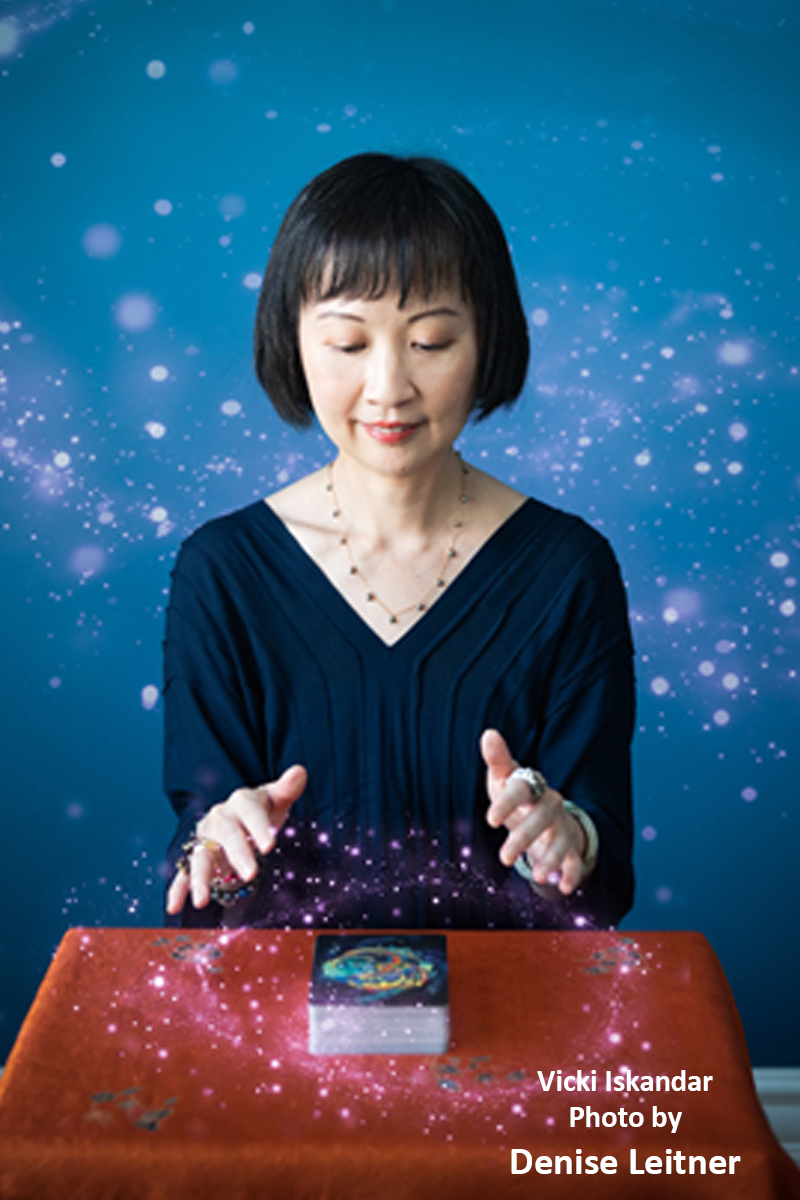 For example, Flying Star Feng Shui is widely practiced in Hong Kong, Malaysia, Taiwan, and Singapore, and it’s what I also practice personally and teach to my clients. In Flying Stars, each home has unique energetic signatures that depend on the direction of the house and the year it was built, and there are annual and monthly influences, even daily ones that interact with the natal energies. Just like we’re not just our sun sign in western astrology or our animal sign in Chinese astrology, we really can’t overlay the same general Bagua energy map when you Feng Shui a house. If we do that, we won’t get to know our home very well. And getting to know your home well and working with the elements can really make a difference to your health, relationships, and fortune. There’s self-work, and then there’s home work. That’s what I think of Feng Shui – home work. Each home is unique, and Feng Shui will help you get to know your home better.
For example, Flying Star Feng Shui is widely practiced in Hong Kong, Malaysia, Taiwan, and Singapore, and it’s what I also practice personally and teach to my clients. In Flying Stars, each home has unique energetic signatures that depend on the direction of the house and the year it was built, and there are annual and monthly influences, even daily ones that interact with the natal energies. Just like we’re not just our sun sign in western astrology or our animal sign in Chinese astrology, we really can’t overlay the same general Bagua energy map when you Feng Shui a house. If we do that, we won’t get to know our home very well. And getting to know your home well and working with the elements can really make a difference to your health, relationships, and fortune. There’s self-work, and then there’s home work. That’s what I think of Feng Shui – home work. Each home is unique, and Feng Shui will help you get to know your home better.
You were a founding editor for Harper’s Bazaar Singapore. Did you originally plan to be a writer growing up?
Not at all, though I’ve always enjoyed writing and the creative process. I wanted to be in a creative field after getting my MBA degree in Marketing and found myself in Singapore at the right time and in the right place. I had a mutual friend introduce me to the managing editor of Harper’s Bazaar Singapore, who was looking to fill her team with new voices, and she was really impressed with a personal lifestyle blog that I was managing at the time.
What were your parents’ reactions to you proclaiming your career in Chinese spiritualism?
They’re neutral about it. I’d never insisted on such a career and they accepted, as I did, that it just came naturally.
What’s in the near future for Vicki Iskandar?
Currently, I’m updating my offerings to include more one-on-one mentorship opportunities as well as designing more group workshops and events in 2024. I’m no longer offering one-of readings as I find that my clients who keep leveling up and thriving are the ones who consistently integrate Chinese astrology, Feng Shui and Qi Men Dun Jia into their life year after year. There’s so much more progress when we collaborate with the annual influences t home and in our personal and professional life.
Thank you again, Vicki! I look forward to hearing your talk at Vitello’s.
Vicki’s presentation at Vitello’s Velvet Martini Lounge is free, there is a $35 food/drink minimum per person. Should you also like a reading from Vicki that night, log onto the button below for reservations:
Comments

Videos
